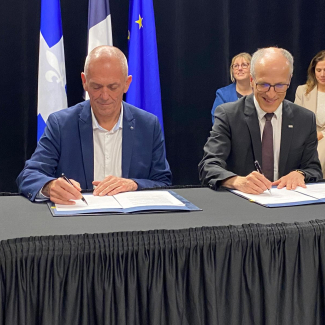
“Research reinforces European integration”
In the light of the European elections on 9 June, Antoine Petit, Chairman and CEO of the CNRS, looks at the issues at stake for European research.
On June 9th European citizens will all be asked to vote on the renewal of the European Parliament. The decisions taken at the European level actually have a real impact on our daily lives in all areas, research included.
The upcoming tenth European Union Framework Programme for Research and Innovation (FP 10) which succeeds Horizon Europe is currently being drawn up before being submitted to the vote of the new European parliamentary assembly. At this time, it is therefore important to stress how important European funding is in supporting research and innovation which are an important part of our collective capacity to find the right scientific answers to the major challenges of our time like global warming, biodiversity and access to resources.
European research organisations and universities understand this impact and have enhanced their structures every year to increase their influence in decision-making circles in Brussels. The CNRS plays a central role in preparing the now essential framework programmes at our Brussels Office located in the Maison Irène et Frédéric Joliot-Curie – a platform for French research, innovation and higher education stakeholders – and through joint opinions published in the framework of discussions involving the G6 research group made up of Europe's six leading research organisations, including the CNRS.
This is even more so in France which is third in the country rankings for grants awarded by the European Research Council (ERC) behind the United Kingdom and Germany. Indeed, two years ago our country celebrated reaching the figure of over 1500 French exploratory research projects financed by Europe. This funding substantially benefits the CNRS as the leading institution hosting such French projects and the employer of over half of the winners of ERC excellence grants.
Europe also means shared research infrastructures. These are essential pillars of our strategy, scientific sovereignty and also of collaborative research. Research infrastructures are provided with substantial budgets and thus mean high-level technical and methodological expertise can be pooled to work on unique instruments that feed into and actually host cutting-edge research over the long term. Such infrastructures are also a key factor in the attractiveness of Europe, firmly grounding the continent as one of the world's leading centres for research. Research infrastructures also contribute to scientific diplomacy when foreign policy issues require scientific input while the scientific relations they promote also help strengthen relations between States. In this way, research also helps reinforce European integration.
Europe is also a forum for exchanges on major transversal issues that cut across research fields like the essential question of the place of women. The CNRS was recently awarded the European Gender Equality Prize by Iliana Ivanova, the European Commissioner for Innovation, Research, Culture, Education and Youth, in recognition of our work on promoting women in science over the last twenty years. This award was created in 2023 and illustrates how the lines are moving on the European scale. It also particularly demonstates how the great collective will to improve our societies is shared throughout the fields of research and innovation.
All of this means the vote on June 9th is far from a secondary issue. This vote will set the course for future European research policy which actually needs to be even more ambitious to provide effective responses to the challenges we are facing.


